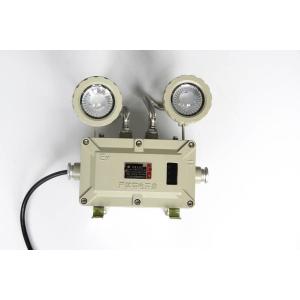

Add to Cart
1. Shipbuilding and Offshore Engineering
Typical Companies:
Shipyards (such as Hyundai Heavy Industries and China State
Shipbuilding Corporation)
Offshore Wind Power Companies
Port Oil Depots
Application Scenarios:
✔ Ship Engine Rooms (Fuel Vapor Environment)
✔ Offshore Oil Platforms
✔ Liquefied Natural Gas (LNG) Tankers
Reason: Fuel vapor can easily accumulate in confined spaces on
ships, and explosion-proof lighting can prevent fires.
2. Sewage and Waste Treatment Plants
Typical Companies:
Municipal Sewage Treatment Plants
Landfills (Biogas Collection)
Biomass Energy Companies
Application Scenarios:
✔ Biogas Collection Areas (Methane Explosion Risk)
✔ Sludge Treatment Plants (Flammable Gases Like Hydrogen Sulfide)
Reason: Explosive gases such as methane (CH₄) and hydrogen sulfide
(H₂S) may be generated during sewage treatment.
Explosion-proof products (such as explosion-proof lamps,
explosion-proof control boxes, and explosion-proof cables) are core
equipment for ensuring industrial safety, especially in high-risk
industries such as the petroleum, chemical, mining, and
pharmaceutical industries. Their importance is primarily reflected
in the following aspects:
1. Preventing Explosions and Ensuring Personnel Safety
Flammable and Explosive Environments Contain High Risks: Oil,
natural gas, and dust, when exposed to sparks or high temperatures,
can easily cause explosions.
The Function of Explosion-Proof Products: Through specialized
designs (such as flameproof enclosures and intrinsically safe
circuits), they prevent internal sparks or high temperatures from
igniting hazardous gases/dust.
Reducing Casualties: Preventing worker injuries and deaths from
explosions and complying with occupational health and safety
regulations (such as OSHA and GB 3836).
Case Study: A chemical plant failed to use explosion-proof
lighting, resulting in a methane explosion caused by a short
circuit in conventional lighting, resulting in significant
casualties.
2. Protecting Critical Equipment and Minimizing Economic Losses
Industrial equipment is expensive: Oil platforms, refineries, coal
mines, and other facilities are highly valuable, and explosions can
result in tens of millions in losses. Explosion-proof products:
Prevent damage to equipment caused by sparks, arcs, or overheating,
extending its service life.
Reduce the risk of production downtime: An explosion can cause a
factory to shut down for months, disrupting the supply chain.
Case: A fire on an offshore drilling platform caused by a faulty
non-explosion-proof motor resulted in hundreds of millions of
dollars in repair and production losses.
3. Comply with international regulations to avoid legal risks.
Strict global regulation:
EU: ATEX Directive (2014/34/EU) mandates the use of explosion-proof
equipment in high-risk areas.
US: NEC (National Electrical Code) 500-506 zone classifications,
OSHA regulations.
China: GB 3836-2010 explosion-proof standard, Coal Mine Safety
Regulations (AQ standard).
Penalties for violations: Companies that fail to use compliant
explosion-proof products may face heavy fines, production
suspensions, and even criminal prosecution.
Case: A chemical plant was fined €500,000 and ordered to suspend
operations by the EU for using non-certified explosion-proof
switches.
Features:
Fireproof high temperature resistant aluminum alloy housing + tempered glass reflector + stainless metal decal, elegant and exquisite in appearance; adopt safe intelligent circuit design to ensure that the lamps work stably, high brightness and long lifespan LED
